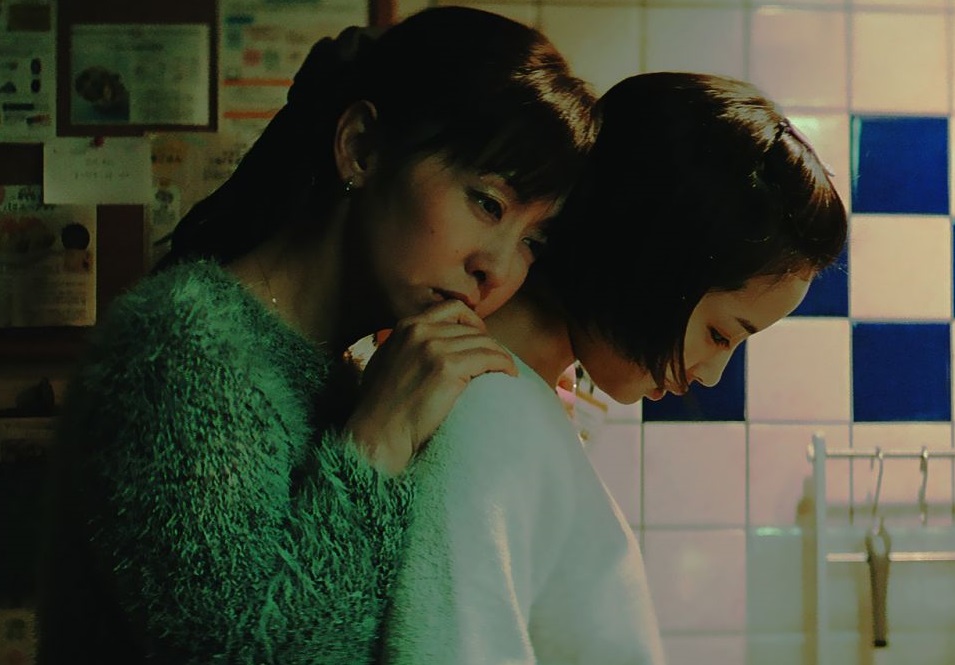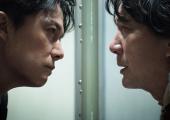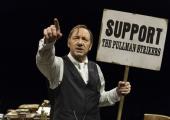Japanese director Kore-eda Hirokazu offers up mystery aplenty in his new film The Third Murder, enigma and riddle too. He also moves away from the territory of family drama for which he is best known. There’s similar intensity in some of the relationships between characters here as in his previous work, and it’s engrossingly atmospheric – some visual elements speak as strongly as anything the director has made, while Ludovico Einaudi’s piano/cello-dominated score is almost a player in itself – but even for Kore-eda fans it will surely come as a surprise.
The opening scene of The Third Murder does indeed depict a killing, but the director then spends the next two hours slowly demolishing any sense of certainty we began with about what was actually done, and by whom, let alone why. It isn’t a courtroom drama, though part of the second half does play out in that environment, but rather a legal procedural, overlaid with philosophical elements, and permeated with a sense of life’s strange whimsy that sometimes isn’t far away in feel from the work of Haruki Murakami.
The cycles and variations of parent and child relationships continue
The central relationship is between confessed murderer Misumi (Koji Yakusho) and his lead lawyer Shigemori (Masaharu Fukuyama, one of Japan’s top singer-songwriters, whose screen career includes Kore-eda’s 2013 Like Father, Like Son), who’s been brought into the case by his senior colleague to try to clarify things. Given the confession, the lawyers’ main preoccupation is to try to avoid the death sentence (which remains in force in Japan): the film’s title, we assume, is explained by the fact that Misumi had previously served 30 years for a double murder, making such a verdict all the more likely. The judge in that earlier case had been Shigemori’s father, prompting some reflection on the ethics of capital punishment (not to mention the human condition), but Kore-eda doesn’t take any strong stand on that issue per se.
Misumi’s position at the opening seems clear, and he has admitted his guilt: having stolen money to fuel a gambling habit, he bludgeoned to death the owner of the small factory where he had been working, and then burnt the body. It’s when he starts to change the details of that story that confusion sets in, prompting in Shigemori a growing engagement that sees him travelling to meet the victim’s wife and daughter (Hirose Suzu is particularly striking as the daughter, pictured below, right), as well as research other aspects of his client’s past. It takes him to some of the remoter regions of Japan, especially Hokkaido in the north – how far it all is from the big city environments that we more often associate with the country – with elements that take us back in time, too.
But the film’s central space remains the prison meeting-room in which the lawyers interview their client; the two sides are separated by a thick transparent screen which allows for strange degrees of close interaction between the two main protagonists when they face each other. In changing his version of events, is Misumi’s memory deceiving him, or is he playing with his lawyer, throwing out diversions from a motivation that may be anything but self-serving? First he uses a press interview to suggest he had committed his crime in collaboration with his victim’s widow as an insurance scam, then hints at much darker elements in that relationship between father and daughter. Kore-eda loosely links that latter element to Shigemori’s own circumstances – he’s divorced, and his relationship with his daughter has clearly been affected by his absorption in his work: the cycles and variations of parent and child relationships continue.
Questions and counter-questions arise as we circle the enigma of what may or may not be the truth. If it all seems something of a game, however macabre, for Misumi, Shigemori’s professional approach is equally ambiguous; as he suggests at one point, “legal strategy is the truth”. We certainly see a lot of legal strategy meetings – some include considerable atmospheric humour in the background – as well as more arcane conferences between judge and the defence and prosecution sides, but on the wider sense of who has the right to judge others, The Third Murder remains silent.
Visually the film reflects the story's interest in artifice. The widescreen cinematography of Kore-eda regular Takimoto Mikiya is darkly distinctive, especially when charting weather and landscapes. But it’s when he brings us into close-ups on the faces of the two main characters as they confront each other in that prison room that something uncanny happens, as their two images seem to merge in profile reflections in the perspex screen that separates them. It’s one of the most unsettling touches in a film that holds back far more than it reveals.
Overleaf: watch the trailer for The Third Murder











